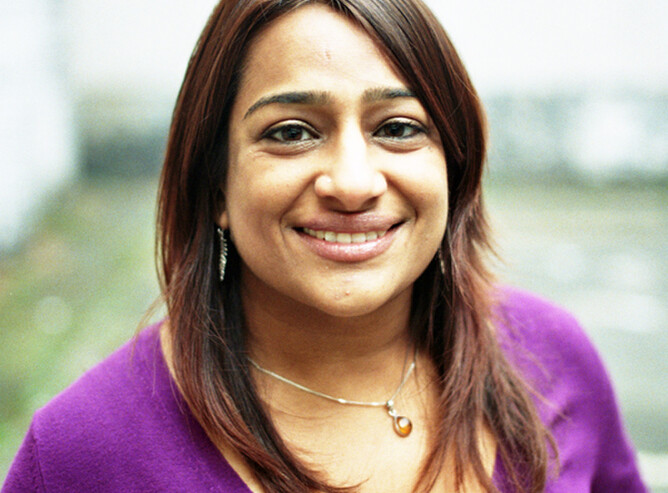Deepa Shastri is one of the UK’s most dynamic young Deaf women, working to make the arts in the UK more accessible and to increase equality.
A fun-loving, bubbly team player who is always striving for equal opportunities for others.
Being a Deaf Asian woman living in United Kingdom, it wouldn’t be unusual for a person from a similar background to face barriers. Living in UK has meant that I have been fortunate not to experience any direct discrimination in my adult life. That doesn’t mean I have been immune to other people’s ignorance/inconsideration/misconceptions/assumptions about race, gender, beliefs, sexuality, disability and social class. Sometimes they say ignorance is bliss, especially if you are a deaf person who cannot pick up what people are talking about. This is probably for the best otherwise I would be permanently angry at everything and everyone! Not being able to hear other people’s comments doesn’t mean I’m also able to ignore what I see. I always try to ensure the balanced is redressed where I can by taking action, e.g. talking to people, trying to change ignorance/unfamiliarity to understanding/familiarity. When I was a baby, my grandfather was the one who suggested that I live in England as he knew Indian disability rights were almost non-existent and I would have received a poor education or faced barriers on daily basis if I stayed there. Today I am now an informed and educated Deaf Asian woman, this would not have been possible if it weren’t for the equality in UK.
- Better quality of life, by making it a law for everyone to have a part-time work culture. This would have a positive, knock-on effect. For example children would have more quality time with their parents which would result in fewer childcare costs. Part-time work would reduce unemployment and there would be more jobs for people by job sharing and increased productivity. Having more people in employment can potentially reduce crime rates in the UK and part-time work would give people time to enjoy leisure pursuits which in turn encourages improved well-being.
- Diversity helps to bring innovation in terms of solutions or ideas.
- Unity/inclusion = less loneliness and more acceptance, especially now we are in an ageing society.
- Life for everyone would be far better e.g. older people who have stigma about age-related hearing loss would have a better quality of life by being able to take part in arts activities that are accessible to them.
- In order to have more equality, we need to clarify the meaning of the term ‘reasonable adjustment’ (the legal term to describe support to ensure disabled people have equal access at work and in society generally); its parameters are currently still far too vague.
There are many turning points in my life, all equally important, as in life it’s always important to be perceptive, strive to improve and treat each learning experience as a turning point.
Back in 2004 I made a documentary in India, which won an award from a film festival in Canada. The documentary was about the comparison of life between UK and India from a deaf perspective. While making the documentary, there were some frustrating moments because in India, deaf people were considered ‘not normal’. This made me determined to become the voice for deaf Asian women. So upon returning from India, I became a member of the board of trustees for Deaf Ethnic Women’s Association 2006. The aim was to empower women in the UK and then to help the deaf people who are similar to them in India.
Before I became a board member for DEWA I was employed by STAGETEXT, which provides captioning and speech-to-text (like subtitles) in the arts and enables people to enjoy arts, culture and entertainment. Since then it has enabled me to make progressive change and improvements in accessibility and social injustice. Eventually I became more involved in the field of disability arts. This led to a placement on the Cultural Leadership Programme to become an Associate Producer for Unlimited for London 2012, which commissioned 29 deaf and disabled artist/arts organisations to create a range of diverse work as part of the London 2012 Festival. This gave the commissions a platform to change perceptions.
In addition, I became a Trustee for Greenwich and Docklands International Festival where the artistic director was the co-director of the Paralympics Opening ceremony. GDIF is one of the most liberal outdoors arts festivals which programmes work by disabled artists/companies and makes free performances available for a wide range of audiences. .
The turning point here is that I fell into the arts by accident and am a firm believer that the arts has the power to improve equality in a more progressive and meaningful way. That has given me the encouragement to continue with this path.
My mother for her love, resilience and determination in encouraging me to achieve my ambitions and not letting my deafness stop me; my father for his love and Indian wisdom/stories that spur me on when I am feeling disheartened; my three younger sisters for their sisterly love and humour; my friends for their advice to make sure I am doing right by the Deaf community, and deaf professionals for sharing their knowledge selflessly.
Lastly but not least, my colleagues at STAGETEXT, the Science Museum, GDIF and disability arts all inspire me to be part of the change where we can slowly address equality.
Photographer Ashton Jean-Pierre's website
